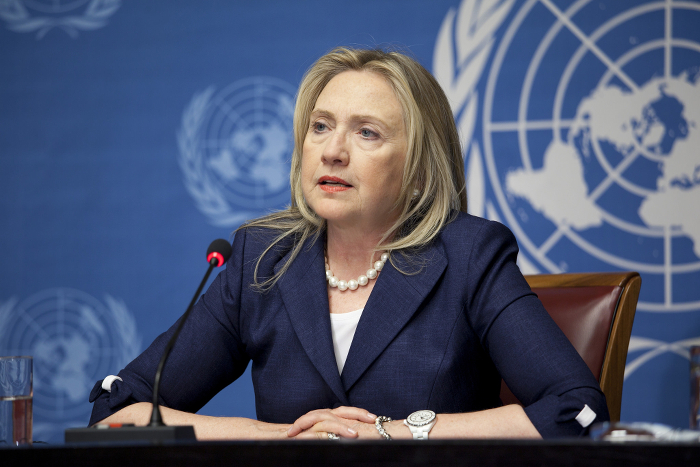The 2016 presidential election in the United States is growing increasingly more baroque, and more terrifying. With Donald Trump effectively clinching the GOP nomination — though he won’t be formally selected until the party’s Cleveland convention in July — all eyes are turning to the Democrats and the knock down, drag out between Senator Bernie Sanders and former Secretary of State Hillary Rodham Clinton. Last year, many predicted that Secretary Clinton would coast to the nomination, but instead, the media have been filled with a nonstop back and forth battle as Senator Sanders’ supporters doggedly insist on sticking to this until the bitter end, no matter the cost.
And that cost could be extremely high.

When Donald Trump began his rise, few people took him seriously, and as he began taking state after state, the GOP started to mobilise against him, with some of the brightest and most aggressive minds of the party coming out against him. Between plans for a contested convention and last-minute attempts at forging allegiances between candidates, the Republican establishment did its best to block a Trump nomination, and it lost, catastrophically. Now, the candidate has moved on to the unthinkable: He’s managing to unite the Republican Party, with conservatives making the best of a bad deal and a shrinking number willing to commit to the #NeverTrump camp. The alternative for these voters is Secretary Clinton, and many are weighing whether they’re willing to cross the line for such a controversial candidate.
Secretary Clinton shouldn’t be controversial: She has decades of policy experience across a wide range of areas, her platform is sensible and well thought out, and she’s responsive to social issues. During her time at State, she took the lead on a number of causes, ranging from improving benefits for her LGBQT personnel well in advance of a larger push to do the same on a national level to identifying climate change as a national security threat and discussing the issue with the Pentagon.
Yet, as opinionator Sady Doyle points out, Secretary Clinton is unilaterally hated across the left and right, regardless of politics, beliefs, and attitudes. She’s hated for being a woman, and she’s hated thanks to years of Republican smears and rigorous campaigning to present her in the worst light possible. She’s hated for being President Bill Clinton’s First Lady, for her perceived failure to push through health care reforms in the early 1990s, for a host of other things that aren’t her fault, and aren’t even associated with her.
This rhetoric from the right is to be expected: The GOP has a vested interest in discrediting the opposing candidate in the interest of winning the November election. Neither party is known for treating the opposition with temperance, and GOP lies and attacks are par for the course. The fact that Secretary Clinton is a woman makes this process even easier, as the party can draw upon sexism’s rich and varied history to advance its goals. The reality is that in the United States, many people, including those on the left, would vote for anyone over a woman.
Democratic war on the convention floor
Yet, the vitriolic attacks that have been most shocking have come from within, as Senator Sanders’ supporters employ threats, intimidation, and smears of their own in an attempt to push their candidate through to the nomination. Senator Sanders, of course, was an independent until very recently, choosing to join the Democrats only in association with the presidential race. Many of his ardent fans are similarly former independents who were disenchanted with the Democrat Party, though they’d historically voted with the party as a general rule. This has become a subject of vicious contention and complaining on the part of Senator Sanders’ supporters, who demand to know why they aren’t allowed to participate in closed primaries (though they were, of course, free to switch their party registration in advance of said primaries).
This weekend’s convention in Nevada illustrated some of the worst parts of the infighting in full flower as supporters threw chairs, sent death threats, screamed on the convention floor, and accused the Democratic Party of slanting the event towards Secretary Clinton. Some complained, for example, about the number of Senator Sanders’ delegates who were excluded from the event, despite the fact that many simply didn’t show up, while others failed to respond to requests from the party to verify their registration and contact information — another reminder that while the Senator’s supporters are noisy and turn out in large numbers to rallies and events, they’re tougher to corral into the voting booth or caucus site.

The situation has passed from robust democratic discussion to troubling rivalry to outright vicious assaults, and Donald Trump is reaping the benefits. As Republicans snicker at the downfall of the Democratic Party — a party that was mocking the Republicans for being unable to control Trump not that long ago — they’re beginning to rally behind Trump, who is slowly gathering more and more Republican support.
Democrats were once confident that Trump wouldn’t be able to capture enough of the Republican vote to realistically take the presidency in November. They were wrong then, and they’re even more wrong now, especially if a third party manifests to siphon off votes — because the moderates who might have swung towards Secretary Clinton rather than vote Trump will undoubtedly spring for a third party instead.
Head to head polls still have Secretary Clinton beating Trump, for the most part, but it’s early yet. We still haven’t finished the primary cycle and the Democratic convention is a long way out. For each week of vicious scrabbling, those head to heads are going to shift. Voters like chaos and entertainment, but now that Trump has buttoned up the nomination and can focus on the general election, he’s the one who will be developing and communicating a cohesive message while the Democrats burn themselves to the ground.
What are the odds of a Trump White House?
The United States is facing a growing risk of a Trump presidency, and the nation should be terrified. Senator Sanders’ supporters need to ask themselves how far they’re willing to go to support their chosen candidate, for while the democratic process should never be infringed for expediency or gamed in preference of one person over another, the consequences of dragging this out could be quite serious. If Democrats cannot rally behind a candidate in time to communicate a cohesive and articulate message, reaching out to voters who fear Trump or are frustrated with the Democratic infighting, voters may get bored with them and turn elsewhere.
July and the Democratic Convention are two months away, and a great deal can happen in two months. As Democratic leaders attempt to sit down with Senator Sanders and discuss the behaviour of his supporters and campaign insiders, they’re afraid of a serious disruption on the floor at Philadelphia. The Senator’s delegates have the right to appear at the convention, to be represented, to advocate for their candidate, but if that spills over into violence, it’s a test of leadership that the Senator is failing, and it’s not a good sign for November. And while the Senator maintains that this is a grassroots problem, evidence suggests otherwise, with major campaign officials, surrogates, and even the Senator himself endorsing violence and abuse to achieve his aims.
It doesn’t have to be this way. A lively discussion between the candidates and their delegates could lead to a much more powerful and engaging convention, and one in which the nominee would emerge with the backing of a united Democratic Party, rather than one rattled and jaded with vitriol. This doesn’t mean giving up for Senator Sanders, but it does mean taking a hard look at his campaign. As someone who has spent decades in politics ostensibly advancing strong principles and standing up for the oppressed, this election represents the Senator’s last shot at the presidency, and the potential to build a terrible legacy if his campaign continues along its current path.
What cost the presidency? Donald Trump may have thought that he’d have to buy his way into the Oval Office, but the Democrats could be offering it up at a steep discount.
Photo: United States Mission Geneva/Creative Commons

